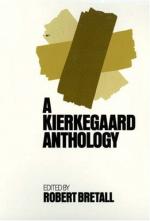
|
| Name: _________________________ | Period: ___________________ |
This test consists of 5 short answer questions, 10 short essay questions, and 1 (of 3) essay topics.
Short Answer Questions
1. What does Kierkegaard argue is merely foreshadowed in Stages on Life's Way?
2. What does Kierkegaard attempt to do according to Robert Bretall in Chapter 5?
3. What does Kierkegaard distinguish between in Either/Or?
4. What does Kierkegaard know about himself in The Journals?
5. What does the hero of Repetition have trouble finding?
Short Essay Questions
1. Who had an enormous influence on German philosophy, and what do many intellectuals agree on?
2. What did Kierkegaard distinguish between in Chapter 2, Either/Or, A Fragment of Life?
3. What do we always place consciousness in, according to Kierkegaard?
4. What is inverted, according to Kierkegaard?
5. What excruciating combination does the young hero in Chapter 5, Repetition endure?
6. What three stages does Kierkegaard introduce in Chapter 7, Stages on Life's Way?
7. Where does Kierkegaard find himself, and what is he doing in Chapter 1, The Journals?
8. What does Kierkegaard turn away from in Chapter 1, The Journals?
9. How does the prophecy in Chapter 5, Repetition come to pass?
10. What does Kierkegaard believe about truth in Two Edifying Discourses?
Essay Topics
Write an essay for ONE of the following topics:
Essay Topic 1
Kierkegaard discusses the hazards in newspapers and in media. Discuss why the press is considered the heart of the public, yet appeals to the worst in humanity. Use the text to support your discussion.
Essay Topic 2
Examine what Christianity means for Kierkegaard. Compare his view of Christianity with that of paganism and pre-Christian religions. Use the text to support your discussion.
Essay Topic 3
Practice in Christianity exposes Kierkegaard's belief regarding the religious individual, particularly in imitating Christ to become a Christian, as well as the paradox of the incarnation. Examine Kierkegaard's definition of a Christian, using the text to support your discussion.
|
This section contains 559 words (approx. 2 pages at 300 words per page) |

|




